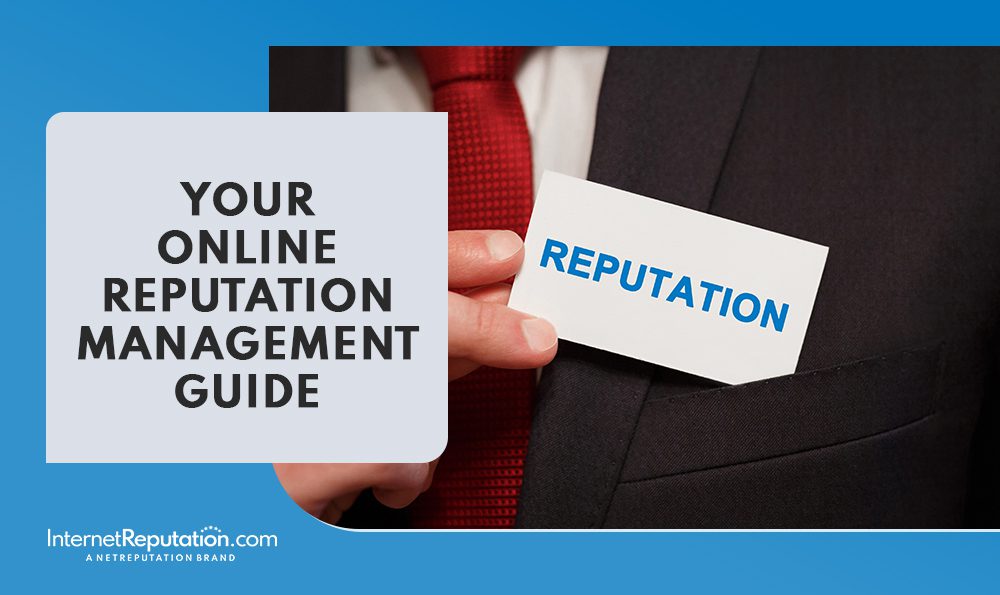Your 2026 Online Reputation Management Guide

Even in the best of times, building a positive online image can be a challenge. Our Online Reputation Management Guide discusses the importance of online reputation and what you can do to protect your digital brand in the year ahead.
Information about online reputation management has been flying around the web more and more as we move deeper into a net-based society. Still, though, most people we talk to don’t entirely understand what online reputation management is. Some have zero clue how it can improve their careers, many assume that it’s all social media-based, and others think it’s something along the lines of public relations.
As you make your way through our Online Reputation Management Guide, you’ll learn what online reputation management is and the role it plays in our media-driven business landscape. This guide is intended to help individuals and companies of every size understand what online reputation management is and why it matters.
Yes, You Do Have an Online Reputation

Not far in the past, the internet was used much differently than it is now. Businesses were marketing to passive audiences, rarely engaging customers. The communication landscape was top-down, and people weren’t empowered to express their voices.
The present-day situation is very different. Websites have moved beyond the status of online brochures, and user-generated content has become critical. Furthermore, regular social media interaction is now vital to business and professional success.
Regardless of who you are, what your business is, or how large it is, people – including customers, clients, investors, and past employees – are noticing your online reputation, and they’re talking about your business. People can and will post to social media sites like Facebook about your products or services, leave comments on your website, and share Stories about their customer experience.
Business owners who think they can bypass this are mistaken. People’s voices, online reviews, and opinions will give you an online reputation, also known as digital reputation, whether you like it or not. And chances are you already have one.
Why Transparency Is Important for Your Online Reputation Management Strategy
With the modern age has come a new focus on transparency. All businesses and professionals are encouraged to be transparent, opening the doors to feedback and criticism to embrace today’s demand for audience engagement.
Below are some basic rules of transparency that today’s businesses are expected to follow:
- Ask customers, clients and employees for feedback and online reviews.
- Embrace and address criticism publicly.
- Create accessible, open communication channels.
- Invite employees to discuss your company’s products and services on a public forum.
If you’re like most businesses, you know that this is easier said than done! Small and medium-sized business owners often struggle with the concept of investing in transparency and communication. This leads to inconsistent, unsuccessful results.
While transparency comes with a measure of risk, it’s more dangerous not to be transparent.
Neglecting Transparency Can Make Your Online Reputation Management Fail
Worrying about the risk that transparency creates has been the downfall of countless companies. Being open comes with a price, and misguided attempts fail more times than not.
If your business or brand invites feedback and customer communication, you must be prepared to face all criticism and comments promptly and with the utmost professionalism.
If you think you don’t need an optimized online reputation management plan before you begin embracing your own transparency journey, consider the scenarios below:
- Your product or service sparks excessive criticism online, some of which goes viral.
- Your employees post to social media in a way that damages your name.
- Your competitors take advantage of scenarios that leave you exposed.
We can help you create a reputation management strategy, even if you’re starting from zero or rebounding from reputational damage. Call us at 941-259-4554 for more information about improving your brand’s reputation.
Know the Online Sentiment About Your Brand
Do you know what the online sentiment is about your brand? Online reputation management is so much more than reacting appropriately to the conversation about your business. It’s also about knowing what’s being said about you so you can respond proactively, which requires monitoring all new content as soon as it hits the web.
Your online reputation is the sum of everything that’s ever been said about your brand online, and you need to be up-to-date on the conversation.
If you monitor everything new about your brand, you can avoid the ineffective approach of responding only to crisis situations. Instead, you’ll be able to stop disaster before it strikes.
You can use social media monitoring technology and review monitoring platforms like those offered by us at Internet Reputation to process new public content as it comes in.
You also have DIY social media monitoring options like Google Alerts if you’re not ready to take a professional route.
Here are a few tips for effectively responding to feedback using your social media accounts:
- Respond quickly, and word each reply to stay true to your brand’s image.
- Always be honest and practice full transparency.
- Accept responsibility for mistakes and poor customer service. Then, take steps to make it right.
- Use timing to your advantage and don’t wait until it’s too late to respond.
Our clients come to us when they need to take control of their digital presence and brand reputation management. Call us at 941-259-4554 to learn more.
Online Reputation Attacks: What They Are and How To Deal With Them
There are two main types of negative media that business owners need to watch for.
The first category includes complaints on social media networks and review sites. While these need to be handled appropriately, they don’t mean instant death for your business. With a good reputation team behind you, negative reviews and other types of negative coverage are relatively easy to deal with.
The second category includes direct attacks on your business’s online reputation. This type of situation can impact your online image for years, reducing your sales and damaging your business beyond recovery.
Moreover, hate websites and direct attacks are likely to appear high in search engine results. These will be highly visible to anyone who looks up your brand. This is why you need a crisis plan before a situation like this occurs.
Let’s get into the most common sources of negative content that could wreak havoc on your reputation.
Negative Feedback
Social media and review websites encourage customers to share their experiences and opinions about your brand. Review sites will ask questions about whether the customer liked your product or service, if they’d recommend your business, and if they feel what you offer is valuable. The feedback on these sites can impact your sales, and negative reviews can cause serious problems.
Hate Websites
Hate websites are a different breed from negative reviews and social media content. These are created by people bent on sharing hateful, illegal, falsified, or otherwise slanderous material online. These sites often attack businesses and public figures, sometimes even using their name in the URL. This type of content can severely damage a business that’s not being protected by proactive online reputation management.
Negative Media Coverage
Before the age of the internet, many businesses believed the adage that “there’s no such thing as bad publicity.” While this still seems to hold true for certain celebrities, it is not the case for businesses. Once your business name or CEO’s name ends up in a negative news article, it can spread through the web like wildfire, causing massive damage.
Again, without proactive online reputation management, it’s easy to see how this could hurt your sales if it’s the first thing potential customers see when they Google you.
InternetReputation.com provides the information and services you need to protect your brand’s reputation. Get started with a free online reputation analysis by calling 941-259-4554 today.
How To Restore Your Brand’s Online Reputation
According to the Universal Declaration of Human Rights, “Everyone has the right to freedom of opinion and expression; this right includes freedom to hold opinions without interference and to seek, receive and impart information and ideas through any media and regardless of frontiers.”
This means that anyone can legally express their opinions about your brand, no matter how negatively they feel about you. Even if the post uses defamatory language, contains falsified claims, or is created with the sole intent to damage your business’s reputation, there’s usually little you can do in response in a court of law. And even if you do have a legitimate legal defense, it’s probably your last resort.
The good news is that you can respond in positive ways and proactively defend your brand from these types of behaviors and posts. Popular methods of restoring online reputation include the following.
Aggressive SEO and ORM
The first (and sometimes second) page of Google is the new business card. In fact, it’s more important than a business card and website combined. Consumers use these first two pages to understand your reputation according to popular news sources, and they form their opinions accordingly.
With aggressive SEO (search engine optimization) and ORM (online reputation management), you can move false and negative information off the first few pages and effectively out of sight. This online reputation management strategy is called content suppression.
This tactic dramatically reduces the impact the negative content has on your reputation. Managed SEO from a respected ORM company like InternetReputation.com is the first step to reclaiming your online presence. Contact us at 941-259-4554 to learn more.
Review Removal
If a reviewer claimed something that’s clearly false and defamatory about your business, or if they filled out their review with improper language, you might be able to request removal via the review website. If this doesn’t work and you don’t have an ORM team on your side, you may need legal help to have the review removed.
Online Investigations
If you’ve been critically attacked by a hate website or other negative news source, and if you can prove the attack is false or illegal, you may be able to work with a skilled professional to find out the identity of the attacker. This can help you gain enough leverage to take legal action and potentially force the removal of the content.
Our Top 10 Online Reputation Management Tips
By now, it should be clear that taking care of your online reputation is of the utmost important. Without a reputation management solution, you’re open to attacks and criticism from all angles.
These 10 tips offer a positive, proactive way to manage your brand’s reputation to encourage positive reviews, maximize your social media presence, impress your target audience and more.
1. Embrace Radical Transparency
Radical transparency means being open and honest with the public and your target audience, and weighing each choice your brand makes against how it will look to the public. Many brands are getting on board with transparency, and the sooner you join them, the better.
2. Build a Respected Name
Respect and trust go a long way when you’re trying to maintain a good brand image. Improve your company, offer meaningful content or services to your users, and go out of your way to stay true to your brand identity no matter what.
3. Stay on Top of the Conversation
If you’re not aware of what’s being said online about your brand, you won’t be able to keep up with customer demand. Consumers will use social media platforms and review sites to decide whether they should buy from you, and it’s up to you to track and respond to what’s being said.
4. Address Criticism and Negative Reviews
The correct response to a defamatory review can turn a negative review into a positive selling point. You may even be able to turn some of the negative feedback into positive reviews if your customers agree to update their comments. Don’t leave the task of addressing criticism up to anything or anyone less than a reputation expert.
5. Always Respond Politely and Quickly
Even if you don’t have time for an in-depth response to a complaint that arises, you can have a canned response that says something like, “Thank you for notifying us of this issue. We will contact you as soon as possible to resolve your complaint.” Replying in some way that shows customers you care is better than no reply at all. This also gives you time to discuss the best possible method of resolution with your team and handle the situation responsibly.
6. Respect the Search Results
We said it before, and we’ll say it again: The first page of Google is the new business card. First impressions are all you get with most of today’s customers, and if they’re seeing words like “scam” or “terrible” in the search results, they’ll take their money elsewhere. Don’t rest until the first two pages of search results about your brand are flawless.
7. Learn From Your Brand’s Mistakes
If you make a mistake and it tarnishes your brand’s reputation, own up to it and learn from it. Tell your audience what you’ll do to avoid making the same mistake in the future, change your policies accordingly, and implement an online reputation management strategy to begin fixing the damage.
8. Understand Your Audience
When you receive a large amount of criticism, use it to better understand your audience. This goes hand-in-hand with learning from your mistakes.
Don’t get angry that your customers don’t like something; make an honest effort to understand. If a large portion of your audience is unhappy about something, the best response is usually to listen, apologize, and make it right.
9. Fight Illegal Behavior
If your attackers are making illegitimate claims, fight back. When someone posts false information about you online, enlist the aid of an expert reputation team and a respected legal professional. Accepting and ignoring illegal attacks leaves you open to similar attacks in the future.
10. Hire a Team to Handle Online Reputation Management Services
Great leaders know when to delegate and when to handle tasks on their own. Unless you have hours of spare time every week and existing knowledge of online reputation management, delegation is the best way to ensure the job gets done right.
Final Thoughts About Brand Reputation Management
Do you want to learn more about protecting your brand’s reputation? If you’re in the middle of a reputation crisis or if you’d like to start being proactive about your reputation management strategy, don’t hesitate to contact us.
At InternetReputation.com, we provide online reputation management information to individuals and businesses who want to create, grow or repair their brand’s reputation. We offer a range of ORM services to take control of your online reviews, social media platforms and more.
Call us at 941-259-4554 to set up a free consultation today. We look forward to speaking with you.
Last updated 12/2025









